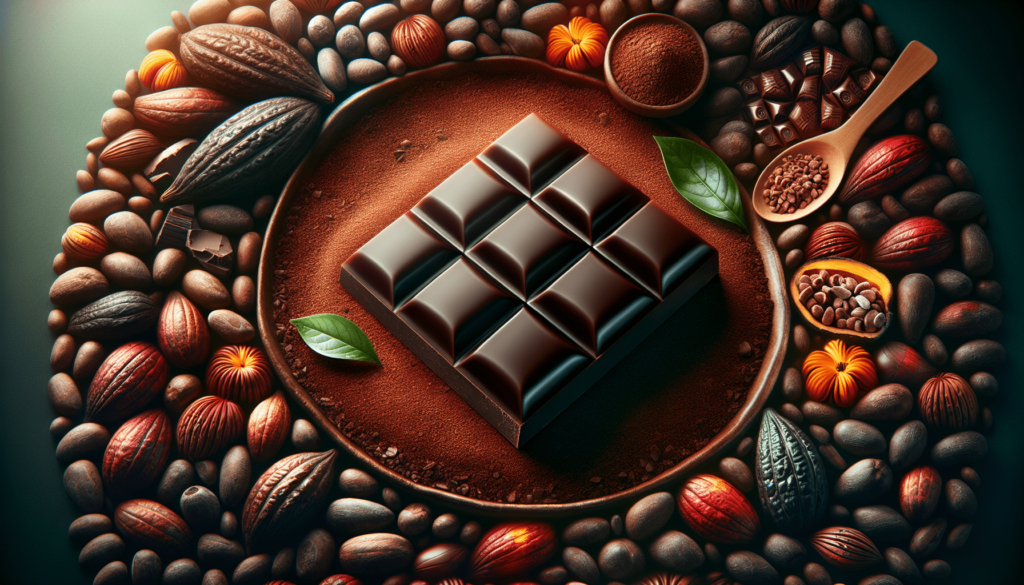Picture this: You’re standing in one of those trendy chocolate shops, wondering which treat to indulge in. Your eyes dart from one beautifully wrapped package to another, but your gaze keeps returning to the alluring dark chocolate bars with that magical number written on the label: 70%. You’ve heard whispers that dark chocolate can be good for you, but is 70% too dark? Will it be a guilty pleasure or a deliciously beneficial snack? Let’s uncover the truth behind this bittersweet temptation.

Nutritional Content of Dark Chocolate
Calories and Fat Content
Dark chocolate is often considered a healthier option compared to its milk chocolate counterpart, and one of the reasons for this is its lower calorie content. On average, a serving of dark chocolate contains around 150 calories, making it a reasonable indulgence for those watching their calorie intake. The fat content in dark chocolate is also relatively higher, which gives it its rich and creamy texture. However, the majority of the fat in dark chocolate is monounsaturated and polyunsaturated fats, which are considered “good” fats that can potentially have positive effects on heart health.
Fiber and Protein
Dark chocolate is surprisingly a good source of dietary fiber, which is essential for a healthy digestive system and can help regulate blood sugar levels. A typical serving of dark chocolate contains around 3 grams of fiber, contributing to your daily recommended intake. While it may not seem like much, every gram of fiber counts! Additionally, dark chocolate contains a small amount of protein, which is essential for various bodily functions such as building and repairing tissues.
Sugar and Carbohydrates
One area where dark chocolate falls behind is its sugar content. While it does contain sugar, the amount is significantly lower compared to milk chocolate. Dark chocolate tends to have a more bitter taste due to its higher percentage of cocoa, which means less sugar is needed to achieve a balanced flavor. However, it is still important to consume dark chocolate in moderation, especially if you are watching your sugar intake or have special dietary needs. In terms of carbohydrates, dark chocolate contains around 15 grams per serving, which is relatively moderate.
Micronutrients
Besides being rich in flavor, dark chocolate is also packed with essential micronutrients. It is an excellent source of minerals such as iron, magnesium, and copper. Iron is crucial for the production of red blood cells, while magnesium helps maintain healthy bones and regulate blood pressure. Copper, on the other hand, plays a vital role in forming collagen, a protein that supports skin health. Incorporating dark chocolate into your diet can be a delicious way to boost your intake of these important micronutrients.
Health Benefits of Dark Chocolate
Rich in Antioxidants
Dark chocolate contains high levels of antioxidants, specifically flavonoids and polyphenols, which can help protect the body against damage from harmful free radicals. These antioxidants have been linked to a reduced risk of chronic diseases such as heart disease and certain types of cancer. Consuming dark chocolate regularly as part of a balanced diet may contribute to an overall healthier lifestyle.
Potential Cardiovascular Benefits
Research suggests that the flavanols found in dark chocolate may have positive effects on heart health. Flavanols have been shown to improve blood flow, lower blood pressure, and reduce the risk of blood clots, ultimately decreasing the risk of cardiovascular diseases. However, it is important to note that these benefits are seen when consuming moderate amounts of dark chocolate with a high percentage of cocoa. Choosing dark chocolate with at least 70% cocoa content ensures a higher concentration of flavanols.
Improves Brain Function
Eating dark chocolate may also have cognitive benefits. The flavanols present in dark chocolate have been associated with improved brain function and increased blood flow to the brain. Studies have shown that regular consumption of dark chocolate can enhance focus, memory, and overall cognitive performance. These findings further support the notion that dark chocolate can be an enjoyable addition to a well-rounded diet.
Enhances Mood
Indulging in a piece of dark chocolate can have a blissful effect on your mood. Dark chocolate contains various compounds that can trigger the release of endorphins, also known as the “feel-good” hormones. These endorphins can help reduce stress, improve feelings of happiness, and even act as natural antidepressants. So, the next time you’re feeling down, reach for a small piece of dark chocolate and let it work its magic.
Potential Risks of Dark Chocolate
High Calorie Content
While dark chocolate offers several health benefits, it is crucial to keep an eye on portion sizes due to its high calorie content. Despite being nutrient-dense, consuming excessive amounts of dark chocolate can contribute to weight gain and hinder weight management efforts. As with any food, moderation is key, and it is important to consider dark chocolate as an occasional treat rather than a regular staple in your diet.
Possible Weight Gain
Due to its calorie content and the potential for overconsumption, dark chocolate can contribute to weight gain if not consumed in moderation. The rich and indulgent nature of dark chocolate can make it easy to lose track of how much you’ve eaten, resulting in an excess calorie intake. To avoid weight gain, it is essential to practice portion control and incorporate dark chocolate into an overall balanced diet.
Interactions with Medications
It is important to be cautious when consuming dark chocolate if you take certain medications. Dark chocolate contains compounds called methylxanthines, including caffeine and theobromine. These compounds can have interactions with certain medications, such as those used to manage high blood pressure or prevent blood clotting. If you are taking any medications, it is advisable to consult with your healthcare provider to determine if there are any potential interactions to be aware of.
Potential Allergies
While dark chocolate is generally well-tolerated, some individuals may have allergies or intolerances to chocolate or specific ingredients commonly found in dark chocolate, such as milk, soy, or nuts. It is important to read ingredient labels carefully and ensure you are not allergic to any of the ingredients before consuming dark chocolate. If you experience any adverse reactions after consuming dark chocolate, such as hives, difficulty breathing, or digestive issues, it is essential to seek medical attention immediately.
Dark Chocolate and Caffeine
Caffeine Content in Dark Chocolate
Dark chocolate contains a moderate amount of caffeine, although the exact content can vary depending on the brand and cocoa percentage. On average, a 1-ounce (28-gram) serving of dark chocolate with 70-85% cocoa contains approximately 12 milligrams of caffeine, which is significantly less than a cup of coffee. However, if you are particularly sensitive to caffeine or have been advised by your healthcare professional to limit your caffeine intake, it is still important to be mindful of your consumption of dark chocolate.
Effects of Caffeine on the Body
Caffeine is a stimulant that affects the central nervous system, increasing alertness and temporarily reducing fatigue. While dark chocolate contains caffeine, the amount is relatively low compared to other sources such as coffee or energy drinks. For most people, consuming moderate amounts of caffeine from dark chocolate is unlikely to cause any adverse effects. However, individuals with certain health conditions, such as anxiety disorders, insomnia, or heart conditions, may be more sensitive to the effects of caffeine and should be cautious about their dark chocolate consumption.

Importance of Portion Control
Moderation is Key
When it comes to indulging in dark chocolate, moderation is key. While it offers various health benefits, consuming excessive amounts can negate the positive impacts and potentially lead to unwanted consequences such as weight gain. Enjoying a small serving of dark chocolate as an occasional treat is a more sustainable approach and allows you to fully appreciate its flavors and benefits while maintaining a balanced diet overall.
Recommended Serving Size
The recommended serving size of dark chocolate is typically around 1 ounce (28 grams), which is equivalent to a small square or two. It is advisable to check the packaging or nutrition label of the specific dark chocolate brand you choose, as some may have different serving sizes. Keeping portion sizes in check will help you manage your calorie intake and ensure you don’t overindulge in this delicious treat.
Balancing Dark Chocolate with a Healthy Diet
Incorporating dark chocolate into a healthy, balanced diet means being mindful of your overall nutritional intake. While dark chocolate can offer health benefits, it should not replace other nutrient-rich foods like fruits, vegetables, whole grains, and lean proteins. Instead, view dark chocolate as a complement to your diet, a small pleasure that can be enjoyed alongside a wide variety of wholesome foods that provide essential vitamins, minerals, and other nutrients.
Choosing the Right Dark Chocolate
Quality and Purity
When choosing dark chocolate, it is essential to opt for high-quality brands that use pure ingredients and minimal processing. Ideally, look for dark chocolate that is made from ethically sourced cocoa beans and does not contain any added oils, artificial flavors, or excessive amounts of sugar. Investing in a quality dark chocolate ensures that you are getting the most out of its nutritional benefits and flavors.
Percentage of Cocoa
The percentage of cocoa listed on dark chocolate packaging refers to the amount of cocoa solids and cocoa butter present in the product. Generally, the higher the percentage of cocoa, the more intense and bitter the chocolate flavor will be. To reap the maximum health benefits from dark chocolate, aim for a cocoa percentage of 70% or higher. This ensures a higher concentration of flavanols, antioxidants, and other beneficial compounds.
Avoiding Excessive Added Ingredients
Some dark chocolate brands may add excessive amounts of sugar, artificial sweeteners, or fillers to enhance the taste or texture. When selecting dark chocolate, read the ingredient list to ensure that the primary ingredients are cocoa, sugar (in moderate amounts), and natural flavorings. Avoid dark chocolate products that contain hydrogenated oils or high-fructose corn syrup, as these can diminish the potential health benefits and add unnecessary artificial ingredients.
Precautions for Certain Individuals
Diabetic Individuals
People with diabetes may wonder if they can enjoy dark chocolate without negatively impacting their blood sugar levels. While dark chocolate has a lower sugar content compared to milk chocolate, it still contains carbohydrates, and portions should be managed accordingly. It is important for individuals with diabetes to work with their healthcare provider or a registered dietitian to determine an appropriate serving size and incorporate dark chocolate into their overall meal plan in a balanced and controlled manner.
Individuals with Kidney Issues
For individuals with kidney issues, including chronic kidney disease, it is important to be mindful of dark chocolate intake due to its potassium content. Dark chocolate contains a moderate amount of potassium, which can be a concern for those with impaired kidney function. It is advisable to consult with a healthcare professional to determine the appropriate dark chocolate consumption based on individual needs and kidney function.
People with Migraines
Dark chocolate contains tyramine, an amino acid that can trigger migraines or headaches in some individuals. While the amount of tyramine in dark chocolate is relatively low, those prone to migraines or headaches may choose to limit their intake or observe if dark chocolate consumption correlates with their symptoms. Understanding your body’s reaction and consulting with a healthcare professional can help determine the optimal level of dark chocolate consumption for individuals with a history of migraines.
Dark Chocolate vs Milk Chocolate
Comparison of Nutritional Content
Dark chocolate and milk chocolate have significant differences in their nutritional content. While both types of chocolate contain fats and sugars, dark chocolate generally has a higher cocoa content, lower sugar content, and more favorable fat composition. Dark chocolate also tends to be higher in fiber, protein, and essential minerals compared to milk chocolate. However, due to its lower sugar content, dark chocolate has a more intense, slightly bitter taste that may not appeal to everyone’s palate.
Differences in Health Benefits
The health benefits of dark chocolate outweigh those of milk chocolate due to its higher cocoa content and associated flavanols and antioxidants. The higher percentage of cocoa in dark chocolate translates to a higher concentration of beneficial compounds, which contribute to potential heart health benefits, improved cognitive function, and mood enhancement. Milk chocolate, on the other hand, contains more sugar and fewer flavanols, diminishing the potential health benefits. When choosing between the two, it is clear that dark chocolate is the healthier option.
The Role of Dark Chocolate in a Balanced Diet
Incorporating Dark Chocolate as a Treat
Dark chocolate can be incorporated into a balanced diet as an occasional treat or indulgence. By viewing it as a special treat, you can savor the flavors and enjoy the benefits without overindulging or compromising your overall nutritional goals. Enhancing your meals or snacks with a small square of dark chocolate can add a touch of indulgence and help prevent any feelings of deprivation.
Pairing with Other Nutritious Foods
Dark chocolate can be paired with other nutritious foods to create satisfying and balanced snacks. Combining a small piece of dark chocolate with fresh fruits, such as berries or banana slices, can provide a decadent and nourishing snack that satisfies your sweet tooth while also providing fiber, vitamins, and antioxidants. Another option is to combine dark chocolate with nuts, which adds healthy fats, protein, and an additional crunch.
Conclusion
Moderation and Individual Factors
When it comes to dark chocolate, moderation is key. While there are numerous health benefits associated with consuming dark chocolate, overindulgence can lead to unwanted weight gain and potential health risks. Understanding individual factors such as allergies, medical conditions, and medication interactions is also important to ensure safe consumption. Always consult with a healthcare professional or registered dietitian for personalized advice regarding dark chocolate intake.
Consulting with a Healthcare Professional
If you have specific health concerns or are unsure how dark chocolate may affect you individually, it is always best to consult with a healthcare professional. They can provide personalized guidance based on your unique needs, including any dietary restrictions or medical conditions. They can help determine appropriate portion sizes and advise on incorporating dark chocolate into your overall dietary plan for optimal health and enjoyment. Remember, a balanced and varied diet is always the foundation of good nutrition, with dark chocolate as a delightful addition.

